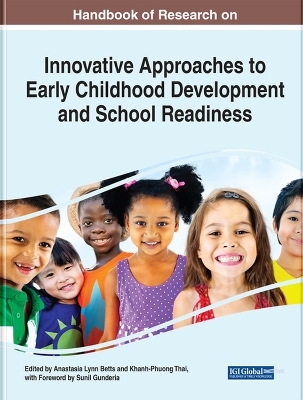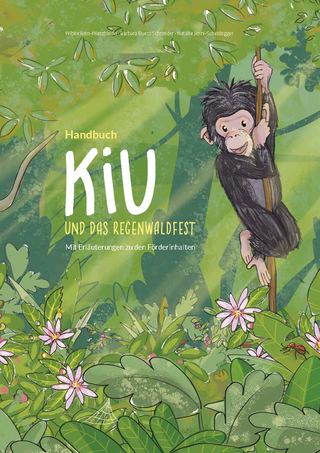
Innovative Approaches to Early Childhood Development and School Readiness
Seiten
2022
Business Science Reference (Verlag)
978-1-7998-8649-5 (ISBN)
Business Science Reference (Verlag)
978-1-7998-8649-5 (ISBN)
Presents current research and thought-leadership on the ways in which innovative education stakeholders are working together to impact what are perhaps the most critical years in a child's education - the years leading up to and including kindergarten.
Educational inequalities between students begin early, as children enter kindergarten with vastly different sets of background knowledge and experiences that do (or in many cases do not) prepare them to learn successfully in school. Many children enter school with skills and prior knowledge so low that they are unable to overcome this lack during the kindergarten year, leaving them unprepared for first grade. Predictably, these deficits only widen as the children progress on to subsequent grades. Conversely, children who enter kindergarten prepared to learn, and leave kindergarten having mastered key competencies in literacy and numeracy, are more likely to succeed throughout their schooling and later in life.
The recent pandemic has only exacerbated this problem of learner variability. Differences in school approaches to remote or hybrid learning and variability in family and home environments have all impacted the performance of children, many of whom are now nearly a year behind. The pandemic has forced us all to consider the ways in which traditional models of schooling have fallen short, and how we might better design programs that leverage all the inputs in a young child's life (the home, parents, school, community, technology, and more) to ensure that their learning needs are met.
If we hope to solve this problem at scale, we must re-examine what we know about these formative early years and develop new ways to ensure that children enter kindergarten ready to learn and leave kindergarten with all the competencies they need succeed in later schooling and beyond. We must consider of all the factors that contribute to a child's school readiness, as well as the critical learning must take place during the kindergarten year. It requires the examination of factors that most influence children's development during the first five years, and their lasting effects on the rest of children's lives. More importantly, we must examine the ways that we, as stakeholders, can influence outcomes for young children by creating synergies between and among these various factors.
With all this in mind, this book proposes to assemble the most current research and thought-leadership on the ways in which innovative education stakeholders are working together to impact what are perhaps the most critical years in a child's education – the years leading up to and including kindergarten. Ensuring that children enter kindergarten ready to learn and leave kindergarten with all the key competencies required for later success must be pursued with intensity, creativity, and purpose if we truly wish to address learner variability and its impact on achievement at scale. This book will Illuminate the problem of learner variability in early childhood education, its short and long-term effects on K-12 education and life beyond school, and the potential of technological innovations to address this problem at scale.
Educational inequalities between students begin early, as children enter kindergarten with vastly different sets of background knowledge and experiences that do (or in many cases do not) prepare them to learn successfully in school. Many children enter school with skills and prior knowledge so low that they are unable to overcome this lack during the kindergarten year, leaving them unprepared for first grade. Predictably, these deficits only widen as the children progress on to subsequent grades. Conversely, children who enter kindergarten prepared to learn, and leave kindergarten having mastered key competencies in literacy and numeracy, are more likely to succeed throughout their schooling and later in life.
The recent pandemic has only exacerbated this problem of learner variability. Differences in school approaches to remote or hybrid learning and variability in family and home environments have all impacted the performance of children, many of whom are now nearly a year behind. The pandemic has forced us all to consider the ways in which traditional models of schooling have fallen short, and how we might better design programs that leverage all the inputs in a young child's life (the home, parents, school, community, technology, and more) to ensure that their learning needs are met.
If we hope to solve this problem at scale, we must re-examine what we know about these formative early years and develop new ways to ensure that children enter kindergarten ready to learn and leave kindergarten with all the competencies they need succeed in later schooling and beyond. We must consider of all the factors that contribute to a child's school readiness, as well as the critical learning must take place during the kindergarten year. It requires the examination of factors that most influence children's development during the first five years, and their lasting effects on the rest of children's lives. More importantly, we must examine the ways that we, as stakeholders, can influence outcomes for young children by creating synergies between and among these various factors.
With all this in mind, this book proposes to assemble the most current research and thought-leadership on the ways in which innovative education stakeholders are working together to impact what are perhaps the most critical years in a child's education – the years leading up to and including kindergarten. Ensuring that children enter kindergarten ready to learn and leave kindergarten with all the key competencies required for later success must be pursued with intensity, creativity, and purpose if we truly wish to address learner variability and its impact on achievement at scale. This book will Illuminate the problem of learner variability in early childhood education, its short and long-term effects on K-12 education and life beyond school, and the potential of technological innovations to address this problem at scale.
Anastasia Lynn Betts, University at Buffalo, State University of New York, USA Khanh-Phuong Thai, Age of Learning, Inc., USA
| Erscheinungsdatum | 10.03.2022 |
|---|---|
| Sprache | englisch |
| Gewicht | 633 g |
| Themenwelt | Sozialwissenschaften ► Pädagogik ► Vorschulpädagogik |
| ISBN-10 | 1-7998-8649-2 / 1799886492 |
| ISBN-13 | 978-1-7998-8649-5 / 9781799886495 |
| Zustand | Neuware |
| Haben Sie eine Frage zum Produkt? |
Mehr entdecken
aus dem Bereich
aus dem Bereich
Grundlagen - Konzepte - Bildung
Buch | Softcover (2022)
Kohlhammer (Verlag)
CHF 47,60
Bilderbuch, Handbuch, Übungskarten im Set
Buch | Softcover (2024)
Lehmanns Media (Verlag)
CHF 79,90
persistierende Restreaktionen frühkindlicher Reflexe und ihre …
Buch | Hardcover (2023)
modernes lernen (Verlag)
CHF 32,10


